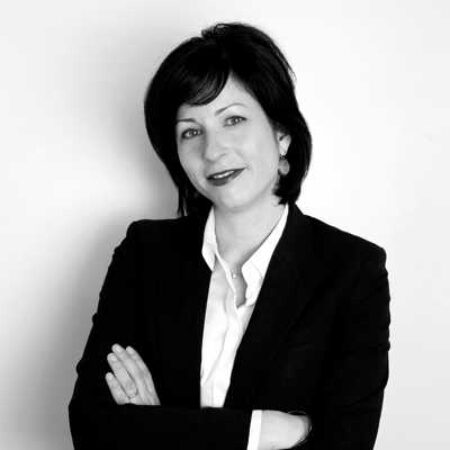Meet Olga Stella. As the Director of Design Core Detroit (DCD) she successfully petitioned for the city’s UNESCO City of Design designation and as a result has widened its presence on an international stage, with tangible moments such as DCD’s organization of exhibits for the St Etienne International Biennale. Like the organization she directs, whose rebrand signaled a move from work concentrated in a ‘corridor’ to the city at large, Stella’s commitment and drive cast an ever expanding vision for design in Detroit.
Case in point: Detroit once had Design Week, now it takes the entire month of September for the subject. As the lead organizer of Detroit Month of Design (MOD), DCD has curated a roster of events and local to national lecturers, that showcase Detroit within a global conversation.
In anticipation for this year’s MOD, on behalf of McIntosh Poris Associates, our design curator Isabelle Weiss spoke with Stella to discuss a critical mission for the design industry, in the city at large, and gain her thoughts on if a ‘Detroit School’, like the LA School, of design, plays a role at this point in time, and how this thinking fits into the DCD mind set of promoting inclusive design.
Isabelle Weiss: What does the idea of a ‘Detroit School’ of design mean to you and Detroit’s Design Core?
Ogla Stella: This is what we are trying to define with the UNESCO City of Design designation, ‘what about Detroit design is distinctive and impactful?’ A lot of work has to be done in Detroit, certainly progress has been made but there is so much to do still and design IS a solution. We have the unique opportunity to show the world what inclusive design can be…design that involves and considers all the stakeholders involved – especially the community – to create positive change. We all have our own terminology for these things and we may not call it ‘The Detroit School’ but we are focused on cultivating Detroit’s unique approach to design for all.
IW: How do you and Design Core act as stewards of inclusive design?
OS: Design Core helps direct the conversation of design as a tool, bringing people together in talking, learning and – most importantly – doing.
IW: So what about the ‘doing’? For example, in architecture and development projects how do you see inclusive design? And work towards a definition of ‘The Detroit School’?
OS: The purpose of design is to work within constraints, is it not? To create something beautiful that meets constraints, like cost for example. We need to have ambitious design ideas for the built environment [in Detroit] but we need to be realistic. Local architects – Detroit architects – are used to dealing with the unexpected and working with the challenges of the environment – finances, developers’ expectations, public processes… and there seems to be a far greater sensitivity to overcoming these challenges with an eye on diversity and inclusivity to make sure revitalization is welcoming for the community.
IW: How do we promote this? How can we achieve greater visibility and appreciation for inclusive design?
OS: One project at time. Each new project represents a culture shift, a person-to-person interaction that is more meaningful than, well, really anything else and can make the most impact on perception (and spur greater action).
IW: Of our projects, which do you feel best fits within the focus of inclusive design?
OS: Definitely, the Foundation Hotel! DFH is an exemplary project and MPA did an absolutely fantastic job of bringing in so many local partners – artists, designers, fabricators – not only to support the local creative economy but really put it at the fore of the whole project and, ultimately, the experience of the hotel. Very intentional.





















